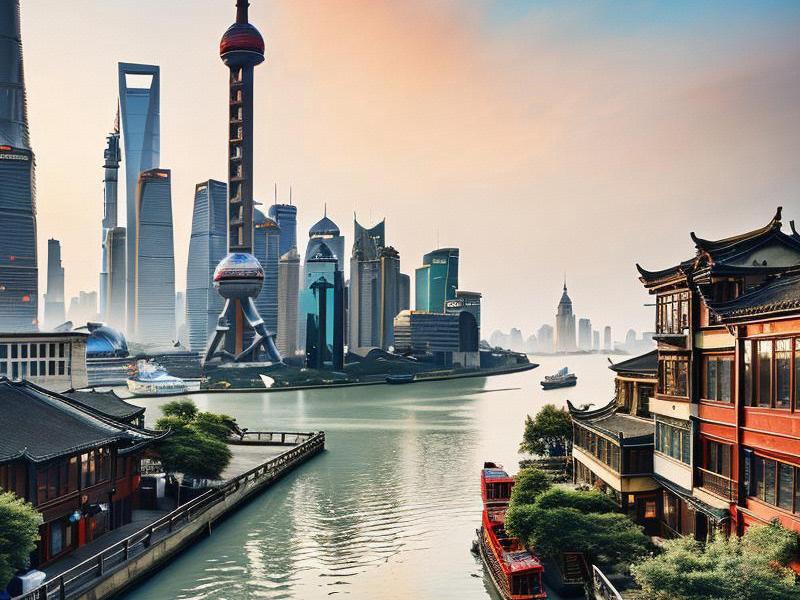This article delves into the multifaceted aspects of Shanghai, exploring its transformation from a modest fishing village to a global metropolis. It highlights the city's economic prowess, cultural vibrancy, and its role as a bridge between China and the world.

Shanghai, often referred to as the "Pearl of the Orient," stands as a testament to China's rapid modernization and globalization. Nestled along the banks of the Huangpu River, this dynamic metropolis has evolved into one of the most influential cities in the world. Its skyline, a blend of historic architecture and cutting-edge skyscrapers, is a visual representation of its rich history and relentless progress.
The story of Shanghai begins in the 19th century when it was forcibly opened to foreign trade following the First Opium War. The establishment of the International Settlement and the French Concession brought an influx of Western influence, leading to the birth of a unique cosmopolitan culture. This period saw the construction of iconic buildings such as the Bund, a waterfront promenade lined with colonial-era structures, which today serves as a symbol of Shanghai's historical significance.
Economically, Shanghai has been a powerhouse since the late 19th century, but its transformation into a global financial hub truly accelerated in the late 20th century. The establishment of the Pudong New Area in the 1990s marked a new era for Shanghai. Today, Pudong is home to the world's tallest building, the Shanghai Tower, and the iconic Oriental Pearl Tower, which has become a beacon for the city's skyline. The area also houses the Shanghai Stock Exchange, one of the largest in the world, and the Lujiazui Financial District, a hub for international finance.
Shanghai's economic success is not limited to finance; it is a major center for trade, manufacturing, and technology. The city's port, the Port of Shanghai, is the busiest container port in the world, handling millions of containers annually. This logistical prowess has made Shanghai a critical node in global supply chains, connecting China to markets around the globe.
上海龙凤论坛爱宝贝419
Culturally, Shanghai is a melting pot of traditions and modernity. The city is renowned for its vibrant arts scene, which includes everything from traditional Chinese opera to contemporary art galleries. The Shanghai Museum, housed in a stunning building designed by the renowned architect I.M. Pei, is a treasure trove of Chinese art and history, attracting millions of visitors each year.
The city's culinary scene is another testament to its cultural diversity. Shanghai cuisine, known for its sweet and savory flavors, is a highlight for food lovers. Dishes such as xiaolongbao (soup dumplings) and shengjianbao (pan-fried dumplings) are must-tries for anyone visiting the city. In addition to traditional Chinese cuisine, Shanghai boasts a wide array of international restaurants, reflecting its status as a global city.
Shanghai's commitment to sustainability and green development is also noteworthy. The city has implemented various initiatives to reduce pollution and promote environmental conservation. For instance, the Maglev train, which connects Pudong International Airport to the city center, is a high-speed, low-emission mode of transportation. Additionally, Shanghai has been investing in renewable energy and smart city technologies to enhance the quality of life for its residents.
上海龙凤论坛419
Education is another area where Shanghai excels. The city is home to some of the best universities in China, including Fudan University and Tongji University, which are renowned for their academic programs and research capabilities. These institutions attract students and scholars from around the world, contributing to Shanghai's reputation as a center of learning and innovation.
Tourism is a significant contributor to Shanghai's economy, with millions of visitors drawn to its attractions each year. In addition to the Bund and Pudong, popular destinations include the Yu Garden, a classical Chinese garden, and the Shanghai Zoo, which houses a wide variety of animals. The city also hosts numerous cultural festivals throughout the year, such as the Shanghai International Film Festival and the Shanghai Fashion Week, which showcase the city's creative spirit.
Despite its rapid development, Shanghai has managed to preserve much of its historical and cultural heritage. The Old City, with its narrow streets and traditional architecture, offers a glimpse into the city's past. The Yu Garden, built in the Ming Dynasty, is a beautiful example of classical Chinese garden design, featuring ponds, rockeries, and pavilions.
上海花千坊419
Shanghai's role as a global city extends beyond its economic and cultural achievements. It is a key player in international diplomacy and cooperation. The city has hosted numerous high-profile international events, including the World Expo in 2010, which attracted millions of visitors from around the world. These events have enhanced Shanghai's global profile and strengthened its position as a hub for international exchange.
The future of Shanghai looks promising, with ongoing plans to further develop its infrastructure and enhance its quality of life. The city is investing in smart technologies, green energy, and sustainable urban planning to ensure that it remains a leading global metropolis. Initiatives such as the construction of the Hongqiao Comprehensive Transportation Hub aim to improve connectivity and reduce traffic congestion, making the city more livable for its residents.
In conclusion, Shanghai is a city that embodies the spirit of modern China. Its economic prowess, cultural vibrancy, and commitment to sustainability make it a model for other cities around the world. As Shanghai continues to grow and evolve, it remains a beacon of progress and a symbol of China's rise on the global stage.